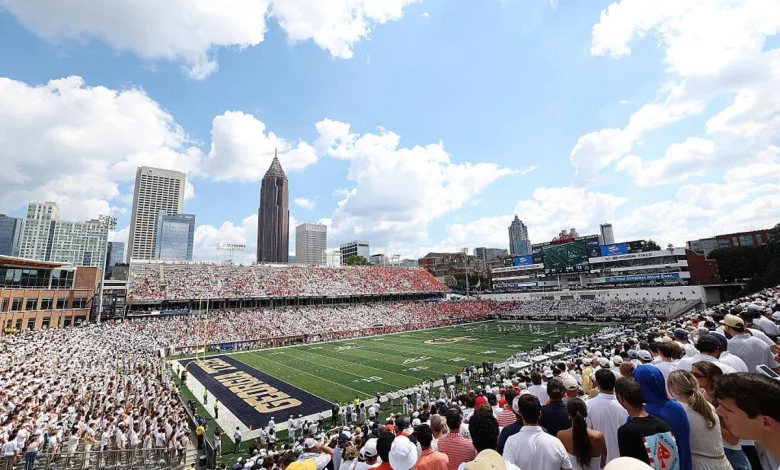Georgia Tech sold its Georgia home game for $10 million. It has no regrets – The Athletic

ATLANTA — The scene was popping. On the walk to Bobby Dodd Stadium on Saturday, one walked past fraternities and sororities, tailgates and restaurants, teeming with fans in Georgia Tech gear. Inside the stadium, it was electric, the latest sign of a revitalized program and fans.
“It’s amazing, seeing how this program has done a complete 180,” Yellow Jackets receiver Clayton Powell-Lee said after an October win over Syracuse. “It’s like a full-circle moment when they’re here.”
And yet, when archrival Georgia comes to Atlanta on Friday, for what could have been Georgia Tech’s biggest home game in decades, with national implications, the two teams will meet not at Bobby Dodd, but a couple of miles away at Mercedes-Benz Stadium, where Georgia might end up having more fans.
The reason: Georgia Tech sold the game for $10 million.
The decision was made more than a year ago. By an athletic director who has since left. And before Georgia Tech took Georgia to eight overtimes, the closest it’s come to beating its rival since 2016. And before the Yellow Jackets spent all of this season in College Football Playoff contention, setting this up as the most anticipated game in the series in decades.
The hype was tamped down by Georgia Tech’s loss to Pittsburgh on Saturday, which knocked its playoff and ACC championship hopes to near zero. Still, it’s a rivalry game between a 10-1 Georgia and a 9-2 Georgia Tech, and the home team just gave it away?
Brent Key, right, has a 0-4 record as Georgia Tech coach against Kirby Smart and Georgia, including a 44-42, eight-overtime loss last season at Sanford Stadium in Athens. (Todd Kirkland / Getty Images)
The school appears to have no regrets.
“You could look back and say we wish it was at Bobby Dodd. But I don’t think that the same decision points and opportunities were there,” said Ryan Alpert, hired as Georgia Tech’s athletic director in July. “The facts that they had at the time, and what they were trying to do to put the resources behind (coach) Brent (Key) and the program, that that decision was made and properly made at the time.”
Alpert wasn’t the one who made the decision — he was Tennessee’s associate athletic director — but he can support the decision because he’s in charge now that the football program has that $10 million to spend. Or put another way: That money is part of the reason this year’s team is good.
Georgia Tech announced the move of the game Oct. 15, 2024, citing the need for “new revenue sources.” It knew revenue sharing was coming, meaning schools could pay up to $20.5 million in the 2025-26 school year to athletes, and most schools would be paying the majority to football.
SEC schools, such as Georgia, practically shrugged at that amount. Georgia Tech, however, is part of an ACC that doesn’t have a huge television deal, and its struggles in football had ticket sales and donations at a much lower level than many of the programs it competes against for players and staff. Then-athletic director J Batt, now at Michigan State, decided the offer from Mercedes-Benz Stadium was a financial necessity.
Things, of course, changed quickly. Key already had the program on a better trajectory. Then, a few weeks after the sale of the game, Georgia Tech upset then-No. 4 Miami at Bobby Dodd Stadium. Three weeks later came the epic game at Georgia, which, though a loss, still infused plenty of optimism into the program. Home attendance this year has been the best in years.
“Now we’re starting to get people interested in Georgia Tech football that didn’t go here,” Key said in October.
Key has been publicly supportive of the decision. This summer at ACC media days, the first question he got was what factors led to the Georgia game’s being moved.
“Those are way above my pay grade. I could care less,” Key said, adding: “We could go play them in Piedmont Park. I’m serious, we’ll go home tonight and play them at 5 o’clock in Piedmont Park. I couldn’t give a crap where we play.”
And to be fair, Georgia Tech has actually fared better against its in-state rival when it hasn’t been at Bobby Dodd Stadium: The last victory over Georgia there was in 1999. The last four Georgia Tech wins were in Athens, as was last year’s near miss.
This is a critical time for Georgia Tech’s place in the sport, as Key and others at the school acknowledge. The uncertainty of the ACC beyond 2030, and the overall college landscape, means the program needs to be relevant. The success of the past two years is happening at a perfect time — but with quarterback Haynes King in his last year of eligibility, and the fleeting nature of success, this needs to be sustained.
Part of that is keeping Key, and Alpert said he’s been working on that. And part of that is giving Key and the program the resources to be competitive. Alpert talks of “building a business model that can get us more reoccuring resources.” Building up luxury suites, for example, now that there might be more interest.
Georgia Tech quarterback Haynes King has thrown for eight touchdowns and run for five in his last four games. His eligibility expires after this season, introducing a variable into Georgia Tech’s prospects in 2026. (Winslow Townson / Getty Images)
“We don’t want this to be a one-year, great year, and then regress back over time,” Alpert said. “There’s going to be ups and downs in any program, but we want to be able to build a consistent, championship-level program. And so for me, there’s the head coach and what, what we’re going to do for Brent. So he and I are talking about what’s important to him.”
Georgia Tech as a school — and fan base — also has a renewed desire to be good at football. When Angel Cabrera was hired as school president in 2019, he put an emphasis on it. Benjamin Utt, a Georgia Tech offensive lineman from 1978 to 1981 and now on the alumni board, agreed that there was a collective desire not to be left behind.
“I love Georgia Tech as an academic school, but it’s a business, too, right?” Utt said. “Yeah, you’ve got to survive. And you’ve got to be good. And the money that comes in through athletics helps to do all these unbelievable things we’re doing all around the world.”
That prevented a backlash to selling the Georgia game. But the past month brought news on a similar front that showed tangible progress.
Mercedes-Benz approached Georgia Tech about a deal for next year’s game against Tennessee, the first part of a home-and-home series. It wasn’t for $10 million this time, but not much less, Alpert said.
Before jumping on it, Alpert asked the fans, sending a survey to see how many would buy a six-game season ticket package, and how many would pay for seven games, including Tennessee, at an extra cost.
The response was over 75 percent in favor of the seven-game package. So Alpert told Mercedes-Benz thank you, but he was declining the offer.
“We knew that the fans wanted it, and then also seeing how we were playing this year and the amount of fans that were coming out,” Alpert said. “We’re trying to build this program, and obviously Brent’s done a tremendous job on the football side, so I’m trying to put every resource around him to be successful. And sometimes that’s not just monetary resources. That’s a great home-field advantage.”





